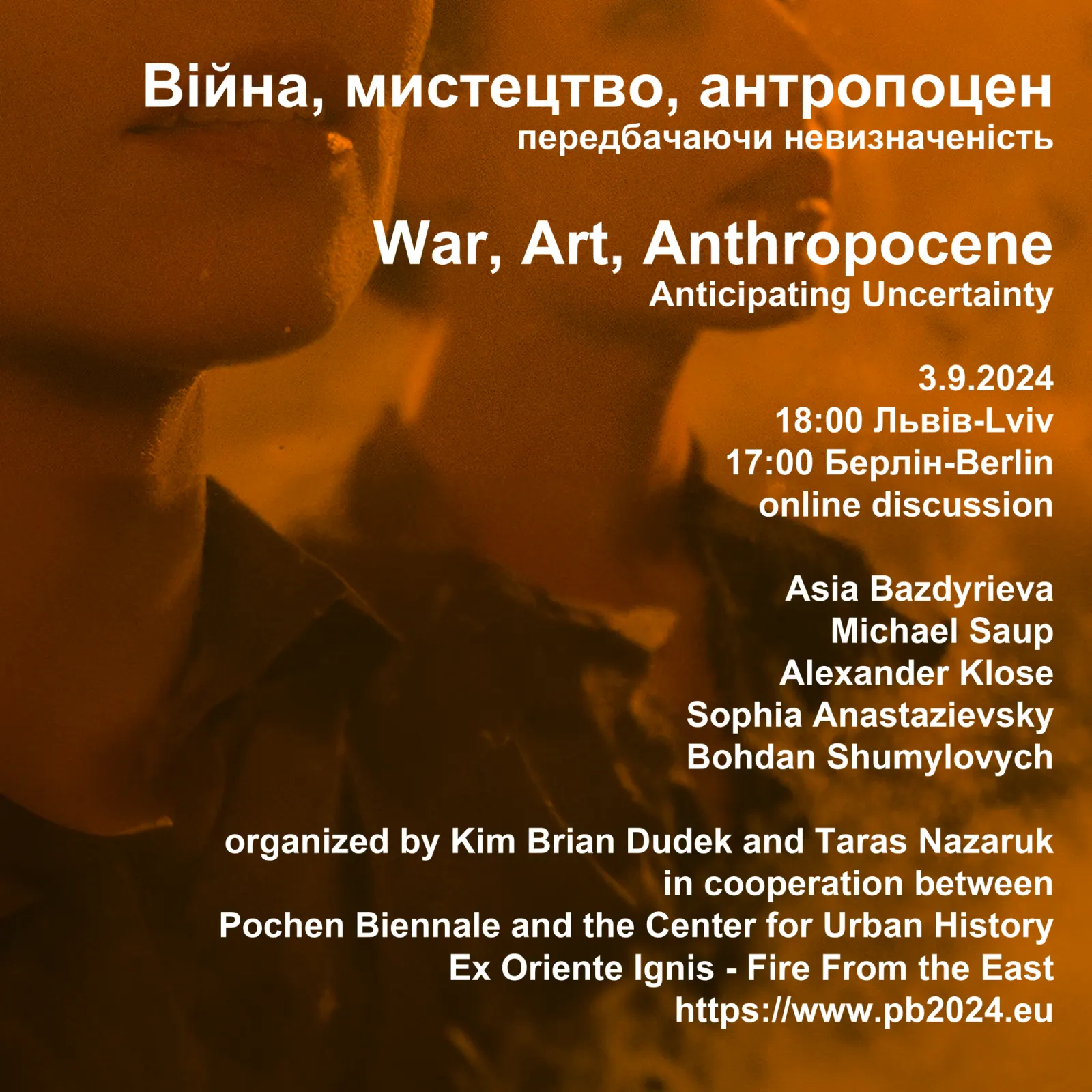War, Art, Anthropocene: Anticipating Uncertainty – Sept 3 2024
online discussion, September 3 2024, 18:00 Ukraine / 17:00 Germany, co-organized by Pochen Biennale Chemnitz and the Center for Urban History Lviv.

Online discussion, September 3, 2024, 18:00 Lviv / 17:00 Berlin
The geological sediment sample taken at Karlsplatz in the centre of Vienna showed traces of nuclear weapon tests, which were conducted from the 1950s and 1960s in the Northern Hemisphere in places as far from Austria as the Arctic island Novaya Zemlya, for instance. The sample was part of the larger exploration of the human impact on the planet with carbon emissions and nuclear pollution, called the Anthropocene debate.[1] In a recent exhibition titled Testing Grounds at Secession in Vienna, artists tackled a pressing issue: they used a local soil sample from Karlsplatz, where trace amounts of plutonium were detected, to explore the enduring imprints of nuclear fallout on our bodies, plants, and the earth’s archives. The Uranium for such nuclear weapons was excavated by the Soviet Union from East Germany, some 500 km from the Karlsplatz, illuminating extraterritorial causes and consequences of global nuclear fallout.[2]
The exhibition in Vienna invoked the concept of the Anthropocene and the collective responsibility for our planet’s future, while Austrian authorities distanced themselves from the European war initiated by Russia against Ukraine, claiming it was an internal matter. Can we truly contemplate collective responsibility in the Anthropocene while ignoring the fire burning in our neighbour’s yard? Can I have clean water if my neighbour is testing bombs underground?
Russia’s invasion of Ukraine proved to continue the weaponisation of nuclear power and fossil fuel as a cause and means of aggression and oppression. The occupation of the Zaporizzhya nuclear power plant and significant environmental disasters like the Kakhovka Damm explosion or damage to the Askania Nova biosphere reserve reshaped the entire landscape and environmental habitat in the south of the Dnipro basin. Kakhovka, being one of the largest hydro-generation stations in Ukraine, along with almost the entire destruction of fossil fuel generation capacity, made the country heavily dependent on the remaining nuclear power generation, green energy, or imported and local off-the-grid generation.
Overall, Russia’s invasion of Ukraine is currently estimated to have caused around 175 million tons of carbon dioxide, which exceeds the annual emissions of a highly industrialized country like the Netherlands.[3] Colonial respecification of the territory and weaponisation of the resources impose an extraterritorial impact on the environment, causing ecocide.
Do we need future sediment samples to make this impact evidential? What can the arts and humanities propose to imagine (challenge?) these future uncertainties of the Anthropocene?
We plan to discuss these questions with artists, curators, environmental humanities and philosophy scholars from Germany, Ukraine and the USA.
Speakers:
- Asia Bazdyrieva is a Ukrainian art historian whose research spans visual culture and environmental humanities. She is currently an associate member of the Critical Media Lab Basel and Research Fellow at the Faculty of Media at the Bauhaus University of Weimar. Her research interest focuses on hybrid European-Soviet modernity and its ideological and material implications in spaces, bodies, and lands. Bazdyrieva co-authored Geocinema, a collaborative project exploring infrastructures of earth sensing as a form of cinema.
- Michael Saup is a German artist, researcher, instrumentalist, filmmaker and coder. He has been a professor at HfG/ZKM in Germany and is the founding director of the Oasis Archive of the European Union. He is the co-founder of the Open Home Project, a humanitarian initiative helping people affected by the Fukushima nuclear crisis in Japan. His ongoing research, called “Infossil – The Archaeology of Future”, focuses on the underlying forces of nature and society.
- Alexander Klose is a cultural theorist, curator and concept developer. His work focuses on the interplay between technologies of communication and transport and processes of social (re)formation. Together with Benjamin Steininger, Klose has been developing the research project “Beauty of Oil. Understanding Petro Modernity”
- Sophia Anastazievsky is a doctoral student in the Department of Government at Harvard University. Sophia specializes in moral, political, and legal philosophy, and works primarily on topics in the ethics of war. She has secondary research interests in the moral and legal dimensions of Russia’s ongoing war in Ukraine. Sophia also holds a B.A. in Philosophy from the University of Chicago, and an M.A. in Bioethics from New York University.
Moderator:
Bohdan Shumylovych is a researcher at the Center for Urban History and an associate professor at the Ukrainian Catholic University. His main areas of work are media history in East Central Europe and the Soviet Union, media arts, visual studies, urban spatial practices, and urban creativity.
The event is organized in cooperation between Pochen Biennale and the Center for Urban History.
Pochen Biennale 2024:
Center for Urban History:
References: